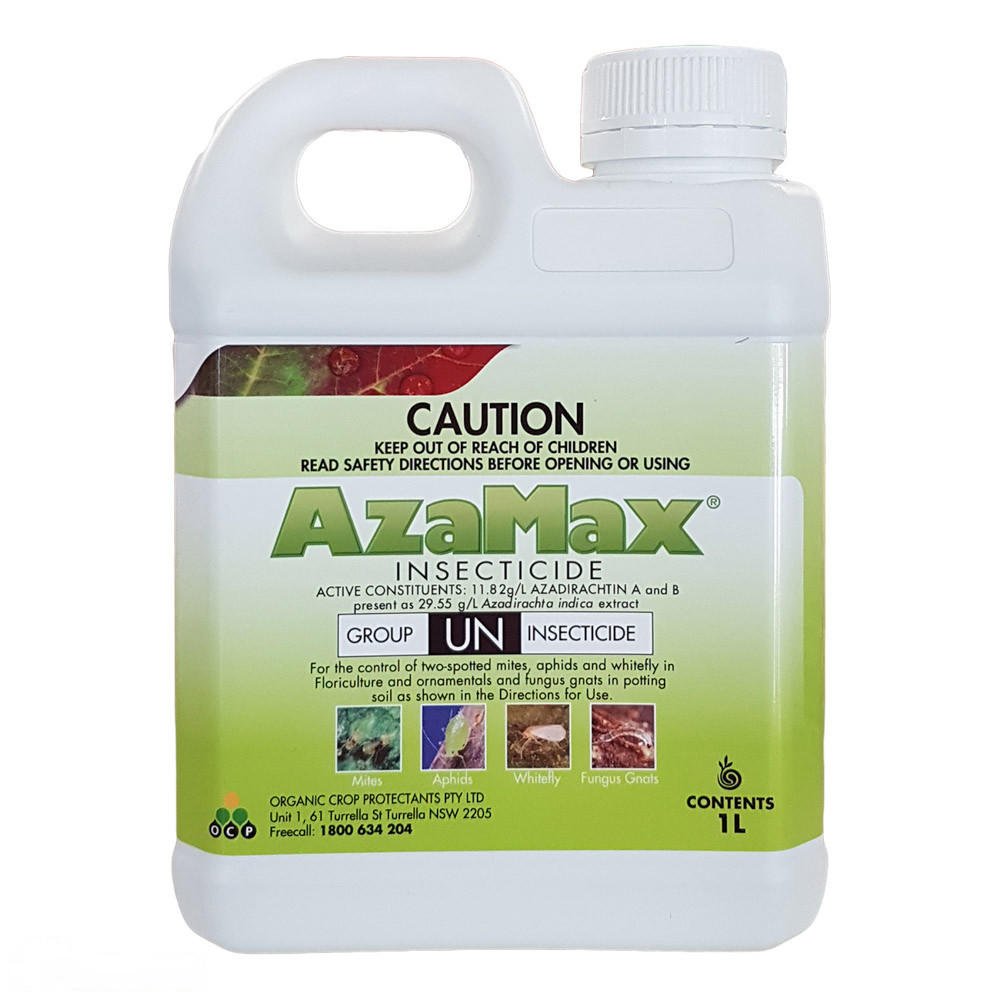Description
THIS PRODUCT: AzaMax Insecticide
Certified Organic natural insecticide made from Azadirachtin
AzaMax contains botanical oils and a concentrated botanical extracts from the neem tree (Azadirachta indica A.Juss). Azadirachtin is one of the most widely researched botanical extracts in the world. AzaMax controls insects by disrupting the hormonal systems that regulate feeding, growth, development and reproduction. AzaMax affected insects stop feeding, stop moulting (stop growing) and lose interest in mating and egg-laying.
Because insects need to feed on AzaMax treated plant surfaces to be affected, its impact on beneficial insects is minor.
In General: Organic natural insecticides are eco-friendly alternatives to synthetic chemical pesticides. They are derived from natural sources and are considered safer for the environment, beneficial insects, and often, humans and pets. Here’s a description of organic natural insecticides and their common uses:
Description: Organic natural insecticides are made from naturally occurring substances or compounds derived from plants, animals, minerals, or microorganisms. They are typically biodegradable and have minimal negative impacts on the environment. Some common examples of organic natural insecticides include neem oil, diatomaceous earth, garlic spray, and insecticidal soaps.
Uses:
- Pest Control in Organic Gardening: Insecticidal Soaps: These are effective against soft-bodied insects like aphids, mealybugs, and spider mites. They work by disrupting the insects’ cell membranes, causing them to dehydrate and die. Neem Oil: Neem oil is derived from the neem tree and is effective against a wide range of pests, including aphids, whiteflies, and caterpillars. It disrupts the feeding and reproductive processes of insects. Diatomaceous Earth: Made from the fossilized remains of diatoms, diatomaceous earth is a natural powder that can be sprinkled on plants to control crawling insects like ants, snails, and slugs. It damages the exoskeleton of insects, leading to dehydration and death.
- Household Pest Control: Essential Oils: Some essential oils like peppermint, citronella, and tea tree oil can be used to create natural insect repellents for use indoors. They can deter pests like ants, flies, and mosquitoes.
- Livestock and Pet Care: Pyrethrin: Derived from chrysanthemum flowers, pyrethrin is used as a natural insecticide for controlling fleas, ticks, and other pests on pets and livestock.
- Crop Protection in Agriculture: Spinosad: A microbial insecticide derived from bacteria, spinosad is used in organic agriculture to control various pests on crops like tomatoes, potatoes, and apples.
- Orchard and Vineyard Pest Management: Kaolin Clay: Kaolin clay, when sprayed on fruit trees and grapevines, creates a protective barrier against insect pests by making the leaves and fruit less appealing to them.
- Companion Planting: Some plants, like marigolds and basil, release natural chemicals that deter certain pests when grown alongside other crops, providing a form of natural insect control.
- Integrated Pest Management (IPM): Organic natural insecticides are often used as part of an IPM strategy, which combines multiple pest control methods, including biological controls, cultural practices, and physical barriers, to minimize the need for chemical interventions.
Overall: It’s important to note that while organic natural insecticides are generally considered safer and more environmentally friendly than synthetic chemicals, they should still be used with care. Follow the manufacturer’s instructions for application, wear appropriate protective gear, and avoid excessive use to minimize any potential harm to non-target organisms or the environment. Additionally, always verify that the product you choose is approved for use in organic gardening or agriculture if that is your goal.


